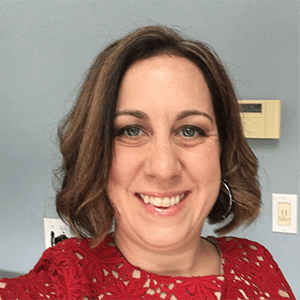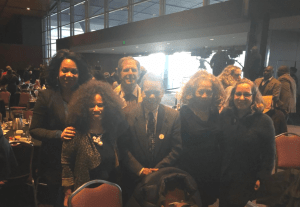By Allyson Bachta, PhD Student in Conflict Resolution, Human Security, and Global Governance
This January 20th, politicians, religious leaders and the Greater Boston community, came together at the Boston Convention and Exhibition Center to honor MLK at the longest running celebration of its kind in the country. The theme for this year’s 50th anniversary event was “The Struggle Continues: Moving Forward Together.” In a passionate speech made by U.S. Representative Ayanna Pressley, we were reminded that the Civil Rights Movement is not over!
Representative Pressley’s remarks brought me back to Spring Break 2019, when I traveled South to trace the journey of Martin Luther King Jr. from Boston University PhD student to one of the most well recognized and respected freedom fighters of all time. Carrying copies of “Stride Toward Freedom”[1] and “A Call to Conscience,”[2] I visited historical sites and read summaries of events in situ from his perspective. Arriving on the steps of his parsonage in Montgomery, Alabama, I was chosen by the tour guide to unlock the front door of the home that he shared with Coretta Scott King and his children during the time that he was pastor at Dexter Avenue Baptist Church. This was the same community where he was “spontaneously” and unanimously nominated to lead and organize the year-long bus boycott associated with the arrest of Rosa Parks. Legend has it that this was a pre-planned nomination made by a community elder that occurred after he arrived late to a meeting from running copies on the mimeograph (Never miss a staff meeting, am I right?). Essentially, this small decision changed the course of history as we know it.
To get to the door, I had to step around the paver memorializing the spot where a bomb was left on January 30, 1956 in order to claim the set of keys dangling from the tour guide’s hands. I was overwhelmed and awed at being allowed to touch and open the same door that MLK and his family walked through every single day. Those that know me well would not be surprised to learn that just like every other door lock that I have ever encountered, I wasn’t able to open it on the first try. After some help entering the home, we walked past a reproduction of Coretta’s piano, through the dining room with its large pocket doors, past the long table where the Southern Christian Leadership Conference was formed, into the library his church built for him so that he could spend more time with his family while finishing his dissertation, and into the kitchen, where red silk flowers Coretta received from Martin a month before his assassination were centered on their original Formica kitchen table.
It was at this same table where I was seated that King himself sat to “think of a way to move out of the picture without appearing a coward”[3] one night after receiving yet another phone call at home threatening his life. At this same table where I sat, perhaps in the very seat that I occupied, he prayed: “I am here taking a stand for what I believe is right. But now I am afraid. The people are looking to me for leadership, and if I stand before them without strength and courage, they too will falter. I am at the end of my powers. I have nothing left. I’ve come to the point where I can’t face it alone.”[4] While surrounded by these touchstones of the Civil Rights movement, in my inclination to respectfully canonize its participants, at times I have easily lost focus on the fact that they were ordinary people who did extraordinary things, in the face of real fear. But, Martin Luther King Jr was not fearless, or tireless, or without human fault.
Within our own backyard we have the opportunity to remember not only the collaboration between Coretta Scott King and Martin Luther King as married partners who met while attending Boston area colleges, but of the urgent need for policy change in addressing the existence and perpetuation of systemic racism and poverty. While these issues were at the very heart of the Civil Rights Movement, more than fifty years later, systemic poverty is still reinforced and perpetuated by inappropriate and ineffective policies and the wealth gap continues to grow across the country.
In that moment of kitchen table prayer, Martin tells of becoming overwhelmed with peace and hearing an inner voice that told him to “Stand up for righteousness. Stand up for justice. Stand up for truth…”[5] So, I ask you: where and how will you stand up for righteousness and truth? What steps can you take within your studies, research, teaching, and leadership to continue the work that MLK began as a student in the Boston area? How will you push through the fear and exhaustion that comes with the effort of making systemic change? What will you say that needs saying to stop people from “being trampled over by the iron feet of oppression?”[6] Just like my trouble with doors locks, we will most definitely not be successful on the first try and we shouldn’t be afraid to ask for help from others when we meet resistance.
“I want to say that in all of our actions, we must stick together. Unity is the great need of the hour, and if we are united, we can get many of the things that we not only desire but which we justly deserve. And don’t let anybody frighten you. We are not afraid of what we are doing, because we are doing it within the law. There is never a time in our American democracy that we must ever think we are wrong when we protest…” – Martin Luther King Jr
“Joy is a necessary act of resistance.” – Representative Ayanna Pressley
Allyson Bachta is a current Conflict Resolution, Human Security, and Global Governance student. She has earned an M.S. in Global and International Education from Drexel University, an M.Ed in Science Curriculum and Instruction and a B.S. in Exercise Physiology, both from the University of Massachusetts Lowell.
Her research interests include:
Peace education initiatives in conflict/post-conflict societies
Truth and reconciliation commissions
Community dialogue for collective action and restorative justice
Non-violent social movements
Intercultural communication
References
[1] King, Martin Luther. Stride Toward Freedom. 3rd ed. Boston, MA: Beacon Press, 2010.
[2] Carson, Clayborne, and Kris Shepard, eds. A Call to Conscience. New York, NY: Grand Central Publishing, 2001.
[3] King, Stride Toward Freedom, 125.
[4] Ibid, 125.
[5] Carson, Clayborne. “The Violence of Desperate Men.” In The Autobiography of Martin Luther King Jr, 63–82. New York City, NY: Warner Books, 1998, 77.
[6] King, Martin Luther. “First MIA Mass Meeting.” First MIA Mass Meeting. December 5, 1955.


